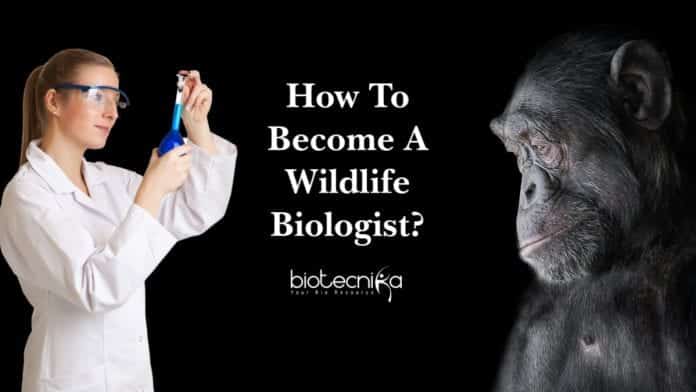Wildlife Biology Career – Eligibility Criteria & Job Scope
“If you can’t excite people about wildlife, how can you convince them to love, cherish, and protect our wildlife and the environment they live in?”
― Steve Irwin, The Crocodile Hunter
Do you love to watch Animal Planet or National Geography where the episodes on animals are telecast? So Informative and exciting, aren’t they? We all have studied about wildlife during higher studies-the behavior of animals, their interactions with the other members of the community, their role in the ecosystem, etc. While considering all these exciting facts, have we ever thought about where the information came from? Well, thanks to the sincere and dedicated work of the Wildlife Biologists, whose research on animals have given us a chance to get an insight into their life.
Table of Contents
Wildlife Biology Career – The Job of a Wildlife Biologist
For someone who enjoys spending time outdoors and traveling becoming a Wildlife Biologist is a fantastic option. Some Wildlife Biologists, however, work in labs or offices and only find themselves in these outdoor locations for small amounts of time. A career in Wildlife Biology is a perfect career option for nature lovers, people who want to contribute significantly towards wildlife conservation, etc.
What To Expect As A Wildlife Biologist?
A Career as a Wildlife biologist can be quite specialized and/or broad, depending on the scope of research or region of the world. While jobs might vary, but many tasks are common to most wildlife biologist careers, including:
- Plan research and coordinate wildlife assessment activities or act as advocate and spokesperson for wildlife and ecosystem concerns within their field of study.
- Interact with other professionals, scientists, and advocacy groups to monitor and preserve habitats and populations in-situ and ex-situ.
- Collect samples and conduct observational research in the lab, protected environments, and field.
- Monitor and document animal behavior in the lab protected environments and field. They have to make sure that the data/specimen collected and record-keeping is accurate and maintains the relevant safety procedures.
- You need to share information and do an assessment of the data with regional, national and international initiatives to review current research and scientific literature in this field continually
- Discuss and implement habitat mitigation and take measures of remediation
- Consult on-site assessments and the environment as they affect wildlife biology
- Do temporary field assignments in some remote locations, and you might even have to conduct oversee wildlife population surveys
- Provide expert testimony and information for ecological and environmental impact assessments. Related to wildlife survey design, provide technical expertise.
- Discuss with experts on how to best mitigate the impacts of development on wildlife
Wildlife Biology Career – What Is the Job Demand for Wildlife Biologist?
Employment of zoologists and wildlife biologists is expected to grow by 5% in the next ten years, which is about as fast as the average for all occupations. To study human and wildlife interactions, more zoologists and wildlife biologists will be needed. As the human population grows, the development associated with it has a massive impact on wildlife and their natural habitats. However, demand for zoologists and wildlife biologists will be limited because most funding comes from governmental agencies, so there are budgetary constraints.
Wildlife gets exposed to threats such as disease, invasive species, and habitat loss, and even climate change as the human population grows and expands into new areas. Many states in India & ascross, the world will continue to employ wildlife biologists to manage conservation projects, wildlife management, etc. Wildlife biologists and zoologists will be required to undertake research & development, carry out wildlife management and conservation plans that combat these threats, and protect our natural resources.
Wildlife Biology Career- Qualification Required For A Successful Career
Wildlife Biologists have high educational requirements as compared to other fields. Because the field requires in-depth knowledge about the various biological phenomena, a minimum Bachelor’s Degree is essential to kickstart your career in the field of Wildlife Biology. You should obtain an undergraduate degree in zoology, wildlife biology, ecology, general biology, or another related field. However, this will only be considered as access to entry-level positions.
A Master’s degree or Ph.D. will be required to secure a job requiring expertise. A Ph.D. in Ph.D. is recommended to obtain funding for independent and university research positions. High-level wildlife biologists should develop excellent computer knowledge, particularly with geographic information systems (GIS), statistical software, and other computer programming techniques.
Wildlife Biology Career – Frequent Job Positions Available For Wildlife Biologists:
- Research Biologists
- Research Assistant
- Wildlife Biologists
- GIS Specialist
- Conservation Ecologists
- Conservation Geneticist
Salary As Wildlife Biologist
An entry-level wildlife biologist earns an average salary of ₹3-4 Lakhs per anum. On the other end, a senior level wildlife biologist at premier government institutes such as Project Scientists, Associate Scientists, etc. earns an average salary of ₹6-8 lakhs per anum.
List of some Colleges and Universities that provide a degree in Wildlife Biology:
Indian Institute:
International Institute:
Here’s An Exciting Tedx Talk Delivered By A Wildlife Biologist
Wildlife Biology Career- Important Quality As Wildlife Biologist
Communication skills. A wildlife biologist needs to write scientific papers and give public speeches in seminars and conferences, deal with policymakers, and academics. So they need to develop excellent communication skills.
Critical-thinking skills. Wildlife biologists need excellent reasoning & judgment capacity to conclude from experimental results and observations. Therefore an analytical approach to a problem is essential.
Emotional Quotient. Wildlife biologists may need to spend long periods in environments where there is no communication. Therefore preparing yourself to stay away from your friends and family is crucial. This requires extreme focus and dedication.
Interpersonal skills. The work wildlife biologist typically involves working in teams. Wildlife biologists must be able to work effectively with others to negotiate conflicting goals and to achieve their targets.
Observation skills. Wildlife biologists must be very attentive towards animals and should have an outstanding observing capability to be able to notice slight changes in an animal’s behavior or appearance.
Excellent Outdoor Surviving skills. Wildlife biologists should be accustomed to extreme outdoor situations. They should possess excellent survival skills, including adapting to outdoor conditions.
Problem-solving skills. Wildlife biologists should be skillful and wise. They are required to find the best possible solutions to threats that affect wildlife, habitat loss, and disease.
Being a Wildlife biologist is challenging but exciting and the most adventurous job an animal lover can seek for. You can come very close to the living things which like us have emotions but fails to communicate in words. If you understand their words, you will see even they have a story to tell. The story of their lives, their ancestors, their requirements. And by knowing the other side of the picture, you will get the opportunity to lessen the gap between those innocent animals and us and do good to both the communities. As Steve Irwin said in his book- The Crocodile Hunter: The Incredible Life and Adventures of Steve and Terri Irwin-
“We don’t own the planet Earth. We belong to it. And we must share it with our wildlife.”
Editor’s Note: Wildlife Biology Career, Wildlife Biology as a Career, Wildlife Biology Career Paths, How To Become A Wildlife Biologist, Wildlife Biologist as a Career
Author: Somrhita Pal & Rahul Mishra







































What we want to do for this job .?